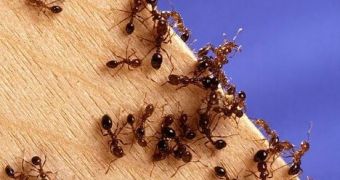A huge colony of ants is reportedly chewing its way to NASA's Johnson Space Center in Houston, destroying computer networks and even cars. The invasion may pose a security risk for the space center, which relies on electronics for its research, and the government agency has already called for exterminator support.
The "electronics-killing" ants are causing short circuits in computing systems located in both homes and offices. According to a news report issued by Dallas News the "crazy raspberry ants" have a different behavior as compared to their siblings, as they wander erratically instead of marching in lines. More than that, they are attracted to any kind of electronic equipment and, once inside it, they start munching on circuitry, knocking them offline.
"These ants are raising havoc", said Roger Gold, professor of entomology at Texas A&M University in College Station. "They're foraging for food and they'll go into any space looking for it. In the process, they make their way into sensitive equipment", gold continued.
Space scientists are already worried, as the large numbers of insects could easily infiltrate inside their computers and take the systems down, which would be a complete catastrophe. The Johnson Space Center also monitors telecommunications satellites as well as other space gear (such as the Hubble telescope).
NASA called in Rasberry, a professional exterminator that has a long experience in dealing with these ants. In fact, they were named after him ("Crazy rasberry ants").
"I think they go into everything and they don't follow any kind of structured line", said Rasberry. "If you open a computer, you would find a cluster of ants on the motherboard and all over. You'd get 3,000 or 4,000 ants inside and they create arcs. They'll wipe out any computer", he continued.
This is not the only large-scale incident involving the IT-killing ants. A few years back, large colonies have attacked a chemical plant in Texas, taking out three main computers that would supervise the pipeline bringing chemicals into the processing unit.
NASA has all the reasons to fear the small and voracious insects, as they got immune to the commonly-used pest-control substances. Rasberry already found three colonies infiltrated in the NASA facilities, but given the fact that they were scarce, they did not pose a security threat.
"With the computer systems they have in there, it could devastate the facility", said Rasberry. "If these ants got into the facility in the numbers they have in other locations, well, it would be awful. I've been in this business for 32 years and this is unlike anything I've ever seen. Anything. When you bring in entomologists from all over the United States and they're in shock and awe, that shows you what it's like", the exterminator concluded.

 14 DAY TRIAL //
14 DAY TRIAL //